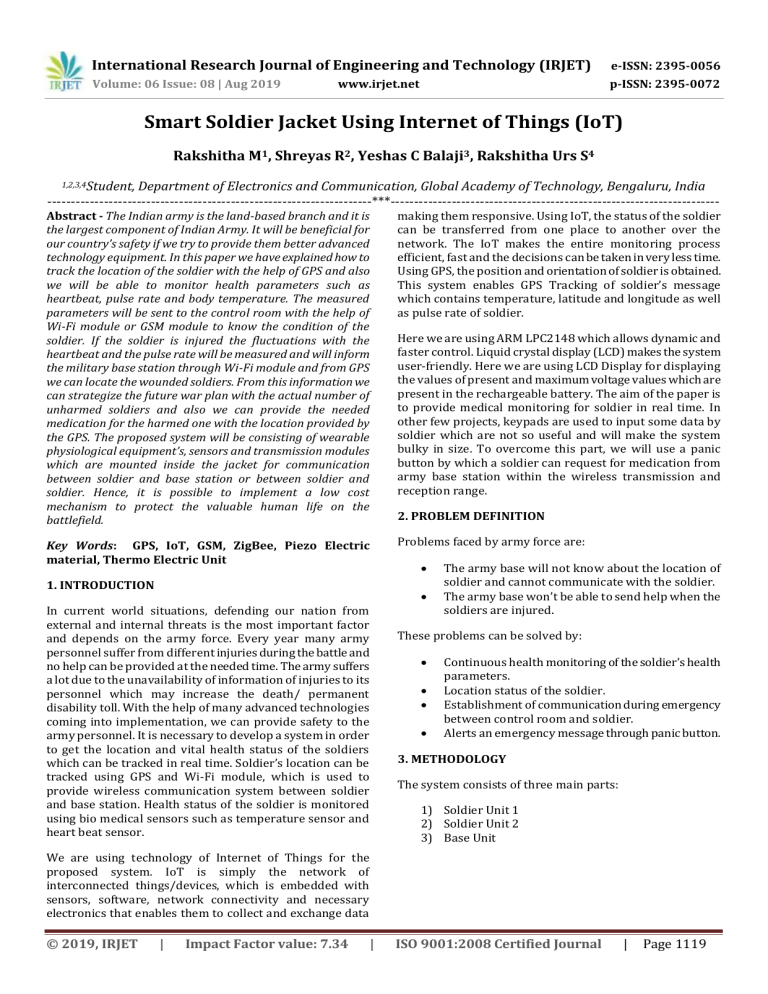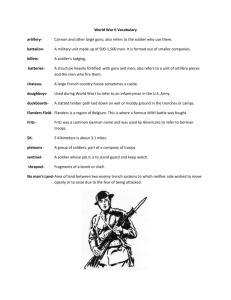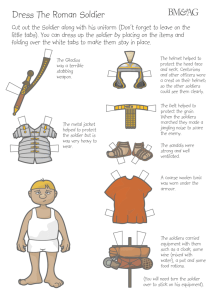Smart Soldier Jacket Using IoT: Research Paper
advertisement

International Research Journal of Engineering and Technology (IRJET) e-ISSN: 2395-0056 Volume: 06 Issue: 08 | Aug 2019 p-ISSN: 2395-0072 www.irjet.net Smart Soldier Jacket Using Internet of Things (IoT) Rakshitha M1, Shreyas R2, Yeshas C Balaji3, Rakshitha Urs S4 1,2,3,4Student, Department of Electronics and Communication, Global Academy of Technology, Bengaluru, India ---------------------------------------------------------------------***---------------------------------------------------------------------- Abstract - The Indian army is the land-based branch and it is the largest component of Indian Army. It will be beneficial for our country’s safety if we try to provide them better advanced technology equipment. In this paper we have explained how to track the location of the soldier with the help of GPS and also we will be able to monitor health parameters such as heartbeat, pulse rate and body temperature. The measured parameters will be sent to the control room with the help of Wi-Fi module or GSM module to know the condition of the soldier. If the soldier is injured the fluctuations with the heartbeat and the pulse rate will be measured and will inform the military base station through Wi-Fi module and from GPS we can locate the wounded soldiers. From this information we can strategize the future war plan with the actual number of unharmed soldiers and also we can provide the needed medication for the harmed one with the location provided by the GPS. The proposed system will be consisting of wearable physiological equipment’s, sensors and transmission modules which are mounted inside the jacket for communication between soldier and base station or between soldier and soldier. Hence, it is possible to implement a low cost mechanism to protect the valuable human life on the battlefield. making them responsive. Using IoT, the status of the soldier can be transferred from one place to another over the network. The IoT makes the entire monitoring process efficient, fast and the decisions can be taken in very less time. Using GPS, the position and orientation of soldier is obtained. This system enables GPS Tracking of soldier’s message which contains temperature, latitude and longitude as well as pulse rate of soldier. Key Words: GPS, IoT, GSM, ZigBee, Piezo Electric material, Thermo Electric Unit Problems faced by army force are: Here we are using ARM LPC2148 which allows dynamic and faster control. Liquid crystal display (LCD) makes the system user-friendly. Here we are using LCD Display for displaying the values of present and maximum voltage values which are present in the rechargeable battery. The aim of the paper is to provide medical monitoring for soldier in real time. In other few projects, keypads are used to input some data by soldier which are not so useful and will make the system bulky in size. To overcome this part, we will use a panic button by which a soldier can request for medication from army base station within the wireless transmission and reception range. 2. PROBLEM DEFINITION 1. INTRODUCTION In current world situations, defending our nation from external and internal threats is the most important factor and depends on the army force. Every year many army personnel suffer from different injuries during the battle and no help can be provided at the needed time. The army suffers a lot due to the unavailability of information of injuries to its personnel which may increase the death/ permanent disability toll. With the help of many advanced technologies coming into implementation, we can provide safety to the army personnel. It is necessary to develop a system in order to get the location and vital health status of the soldiers which can be tracked in real time. Soldier’s location can be tracked using GPS and Wi-Fi module, which is used to provide wireless communication system between soldier and base station. Health status of the soldier is monitored using bio medical sensors such as temperature sensor and heart beat sensor. The army base will not know about the location of soldier and cannot communicate with the soldier. The army base won’t be able to send help when the soldiers are injured. These problems can be solved by: Continuous health monitoring of the soldier’s health parameters. Location status of the soldier. Establishment of communication during emergency between control room and soldier. Alerts an emergency message through panic button. 3. METHODOLOGY The system consists of three main parts: 1) Soldier Unit 1 2) Soldier Unit 2 3) Base Unit We are using technology of Internet of Things for the proposed system. IoT is simply the network of interconnected things/devices, which is embedded with sensors, software, network connectivity and necessary electronics that enables them to collect and exchange data © 2019, IRJET | Impact Factor value: 7.34 | ISO 9001:2008 Certified Journal | Page 1119 International Research Journal of Engineering and Technology (IRJET) e-ISSN: 2395-0056 Volume: 06 Issue: 08 | Aug 2019 p-ISSN: 2395-0072 www.irjet.net BLOCK DIAGRAM 3. Thermo Electric Unit Thermoelectric cooling (Peltier module) uses the Peltier effect to create a heat flux between the junctions of two different types of materials. A Peltier cooler, heater, or thermoelectric heat pump is a solid-state active heat pump which transfers heat from one side of the device to the other, with consumption of electrical energy, depending upon the direction of the current. When the heat flows through the junctions of two conductors, heat from one is removed and it gets cooled. Then heat is transferred to another junction and it heats the jacket when the soldier is in extreme weather conditions. 4. Piezo Electric material for Shoes A piezoelectric sensor is a device that uses the piezoelectric effect, to measure changes in pressure, acceleration, temperature, strain, or force by converting them to an electrical charge. A piezoelectric sensor works on the principle of conversion of energy in mechanical and electrical energy forms. When a polarized crystal is put under pressure, some mechanical deformation takes place in the polarized crystal, which leads in the generation of the electric charge. 5. LPC 2148 Microcontroller Fig 1- Soldier Unit 1 The LPC2148 microcontroller is a 16 to 32-bit ARM7 TDMI with real-time emulation. It has a 128-bit wide memory interface. They consume very less power when compared to others. It has embedded high speed flash memory ranging from 32 kB to 512 kB. It has various 32-bit timers, single or dual 10-bit ADC(s), 10-bit DAC, PWM channels and 45 fast GPIO lines with up to nine edge or level sensitive external interrupt pins. LPC2148 provides 8kB of on-chip RAM accessible to USB by DMA. Single 10-bit DAC provides variable analog output. The microcontroller functions by the voltage provided by the piezo electric material. All the data about the soldier’s health parameters and location is sent to the microcontroller for further processing and the data is stored in the memory. The stored data is then sent to the Base station via Wi-Fi module or it can also be sent via soldier unit 2 using ZigBee if the soldier is at a distance beyond the range. The above figure shows the Soldier Unit 1 and its Block diagram consists of: 1. Heart Beat Sensor Heart beat sensor is designed to give digital output of heart beat when a finger is placed on it. This digital output will be interfaced with LPC2148 microcontroller directly to measure the heartbeats in Beats per Minute (BPM) rate. It works on the principle of light modulation by blood flow through finger at each pulse. The comparator IC LM358 is used in Heart Beat Sensor prototype. Out of which, one will act as an amplifiers and another will be used as comparator for the output of light detector. When the heart pumps a pulse of blood through the blood vessels, the finger becomes slightly more opaque and so less light reached to the detector. With each heart pulse, the detector signal varies. This variation is converted to electrical pulse. 6. 4 x 1 Keypad 2. Temperature Sensor The LM35 is an integrated circuit sensor that can be used to measure temperature with an electrical output proportional to the temperature. The output voltage is linear to the Celsius temperature. Its range is from -55 to +150 C. And has self-heating power. Operating voltage is from 4 to 30V. It measures the temperature of the particular surrounding environment. The LM35 senses the temperature and converts into analog signal which is then again converted into digital format by the ADC. © 2019, IRJET | Impact Factor value: 7.34 | The emergency buttons or a switch will be provided in this system, so that a soldier can request for his help in panic situation by pressing it. As a soldier will press the buttons, the emergency messages that are pre-coded will be sent to the base camp directly. 7. GPS Global Positioning System is a satellite based navigation system. It provides the time and location information to the GPS receiver. GPS works by the method known triangulation or trilateration. The GPS receiver measures the distance by ISO 9001:2008 Certified Journal | Page 1120 International Research Journal of Engineering and Technology (IRJET) e-ISSN: 2395-0056 Volume: 06 Issue: 08 | Aug 2019 p-ISSN: 2395-0072 www.irjet.net calculating the amount of time the satellite’s message took to arrive. The GPS provides the latitude and longitude of the location. 6) All these information is sent to base station as shown in the figure 5. 8. ZigBee ZigBee is an IEEE 802.15.4-based specification for a suite of high-level communication protocols. It is a low-power, less data rate, and close proximity wireless adhoc network. ZigBee sends the information to other soldier in the range and continues till the one in the internet range, where it finally reaches the base camp. Fig4- The hardware implementation. Fig 2- Soldier Unit 2 The above figure shows the Soldier Unit 2 and its Block diagram consists of Arduino Board and Wi-Fi ESP 8266. The data sent by the microcontroller is collected by the ZigBee in the soldier unit 2. It further sends the data to the Arduino Board which processes and sends it to the Wi-Fi module. This data is uploaded to the cloud which can be collected in the base station using a personal computer. Fig5- The information shown in the base station Fig3- Base Unit 5. CONCLUSION 4. RESULT The following results are observed: 1) Temperature sensor will sense the body temperature of the soldier and can be monitored in the base station. 2) This in turn can be used for activating the trigger points to regulate the body temperature at extreme measures. 3) The heart beat sensor will sense the pulse rate or heartbeat of soldiers. 4) Location status is obtained using GPS in terms latitudes and longitudes and be updated in real time. The project reports an IoT based system for the health monitoring and tracking of the soldiers. ARM (LPC2148) board is used which is a low cost solution for the possessing purpose. Biomedical sensors provide heartbeat, body temperature of every soldier to control room. This technology can be helpful to provide the accurate location of missing soldier in critical condition and overcome the drawback of soldiers missing in action. Piezoelectric sensor is also mounted on shoes to produce voltage for microcontroller. We can conclude that this system will act as a lifeguard to the army personnel of all over the globe. In future, a portable hand held sensor device with more sensing options may be developed to aid the soldiers. 5) Piezoelectric sensor mounted on shoes produces a voltage of 13V for a person of 40-75kg. 6. FUTURE SCOPE © 2019, IRJET ISO 9001:2008 Certified Journal | Impact Factor value: 7.34 | The System can be enhanced for making it device to device communication in this way a soldier can communicate with | Page 1121 International Research Journal of Engineering and Technology (IRJET) e-ISSN: 2395-0056 Volume: 06 Issue: 08 | Aug 2019 p-ISSN: 2395-0072 www.irjet.net other soldier without any dependency of base station also using IOT technologies it can be more flexible in collecting nearby information automatically in warfare. Sound can be added to the device so that a sound is output each time a pulse is received. Warning or abnormalities (such as very high or very low heart rates) can be displayed on the LCD or indicated by an LED or a buzzer. The Whole health monitoring system, which we have proposed can be integrated into a small compact unit as small as a cell phone or a wrist watch. This will help the soldiers to easily carry this device with them wherever they go. [4] [5] REFERENCES [6] Jasvinder Singh Chhabra1, Akshay Chhajed1, Shamlee Pandita1, Suchita Wagh2 “GPS And IoT Based Soldier Tracking & Health Indication System” International Research Journal of Engineering and Technology Volume: 04 Issue: 06 | June-2017 [2] Mr.Patil Akshay1, Mr. Shelake Balaji2, Mr. Pinjari Raju3, Ms.Mirajkar P.P.4 “GPS Based Soldier Tracking and Health Monitoring “ International Research Journal of Engineering and Technology Volume: 04 Issue: 03 | Mar -2017 [3] Monika V. Bhivarkar , Anuja G. Asole , P. B. Domkondwar “IOT and GPS Based Soldier Position Tracking and Health Monitoring System” International Journal of [1] [7] Emerging Technologies in Engineering Research (IJETER) Volume 6, Issue 1, January (2018) . Vaishnavi Patil ,Sanjay Singh Thakur,Vaibhav Kshirsagar ,“Health Monitoring System using Internet of Things” Proceedings of the Second International Conference on Intelligent Computing and Control Systems (ICICCS 2018). Priyanka R. Pawar1, Abhijeet B. Desai “Soldier Position Tracking and Health Monitoring System: A Review” International Journal of Innovative Research in Computer and Communication Engineering, Vol. 6, Issue 3, March 2018. Shubhangi Gupta, Shivani Kulshrestha, Divya Singh, Ashish Kumar, Er.Hitendra Singh “GPS and GSM Based Soldier Health Monitoring and Tracking System” International Journal of Advanced Research in Electrical, Electronics and Instrumentation Engineering, Vol. 6, Issue 3, March 2017. Akshita V. Armarkar1, Deepika J. Punekar2, Mrunali V. Kapse3, Sweta Kumari4, Jayshree A. Shelke5 “Soldier Health and Position Tracking System “International Journal of Engineering Science and Computing” Volume 7 Issue No.3, March 2017. BIOGRAPHIES Rakshitha M has pursued her B.E Degree in Electronics and Communication from Global Academy of Technology, Bengaluru. Rakshitha Urs S has pursued her B.E Degree in Electronics and Communication from Global Academy of Technology, Bengaluru. Shreyas R has pursued his B.E Degree in Electronics and Communication from Global Academy of Technology, Bengaluru. Yeshas C Balaji has pursued his B.E Degree in Electronics and Communication from Global Academy of Technology, Bengaluru. © 2019, IRJET | Impact Factor value: 7.34 | ISO 9001:2008 Certified Journal | Page 1122





